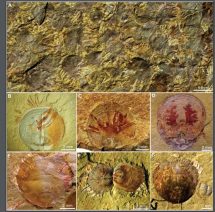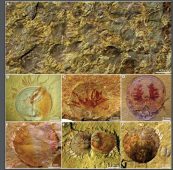The earliest evidence of parasitism found in the fossil record have been unearthed by Macquarie University researchers Professor Glenn Brock and Macquarie alumni Luke Strotz and Tim Topper in a paper published in Nature Communications.

Brachiopod fossils showing parasites
The paper provides the first definitive instance of parasitism in the early Cambrian Period, a period of Earth's history five hundred and fifteen million years ago. During this time, life was starting to differentiate itself into a dizzying array of anatomical forms. One of these were brachiopods - simple, filter-feeding creatures with the soft organs protected by two shells, looking much like modern clams.

Brachiopod fossils showing parasites
The authors compared the biomass of hundreds of brachiopods with and without encrusting tubes- using biomass as a proxy for an individual's biological fitness. Their analyses indicate that the tube-dwelling organisms reduced the biological fitness of the host brachiopod. Tube-bearing brachiopods were an average 26 per cent smaller than their tubeless kin.
In combination with the growth orientation of the encrusting tubes, this indicates that the interaction between the tube-dwelling organisms and the brachiopods was parasitic or more specifically, kleptoparastitic. The tube dwelling organisms attached to shells early on and then grew jointly with the brachiopod, essentially thieving some of the food from the filter feeding currents produced by the brachiopods over their whole life.
Parasites can increase the energy requirements of infected organisms because host organisms need to generate enough energy to satisfy their own requirements plus the nutrients lost to the parasite. This commonly leads to hosts with decreased biomass when compared with uninfected individuals. The marked size difference between infested and uninfested samples clearly indicates that the hosts were adversely affected by their thieving hangers-on.
Professor Brock commented, "This new discovery reveals that intimate parasite-host animal systems arose in early Cambrian benthic communities and their emergence may have played a key role in the evolutionary and ecological innovations associated with the Cambrian radiation. Our paper suggest that parasite-host systems were well established by the early Cambrian period. It pushes back the origins of parasitism by more than 25 million years".
"A dense concentration of early Cambrian brachiopods (Neobolus wulongqingensis) in the Guanshan Biota in Yunnan, China, are exquisitely preserved as fossils," Professor Brock explains.
"Some of the host tubes encrusted and grew on the surface of the shells. All the tubes are oriented in the same direction, towards the front filter feeding stream. Such intimate interactions between animals in deep time are rarely preserved in the fossil record. Yet here hundreds of individuals of the one type of brachiopod are preserved in huge numbers and remarkable detail, some with up to 15 encrusting tubes and some with no tubes at all," Professor Brock said.






